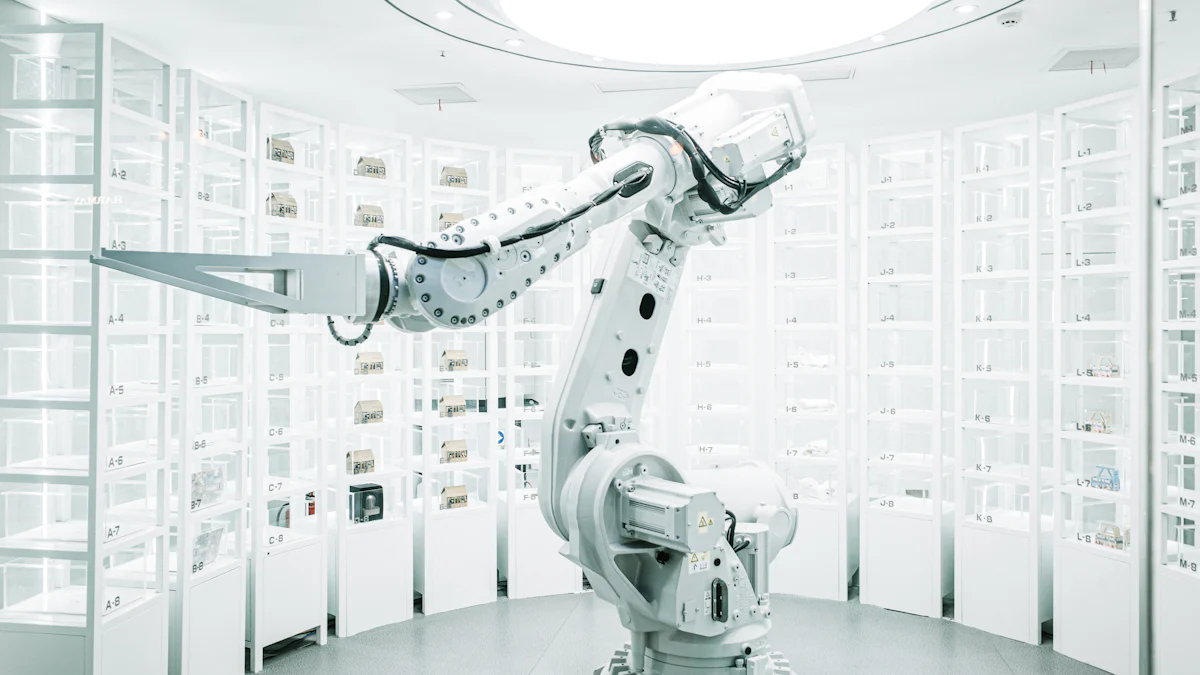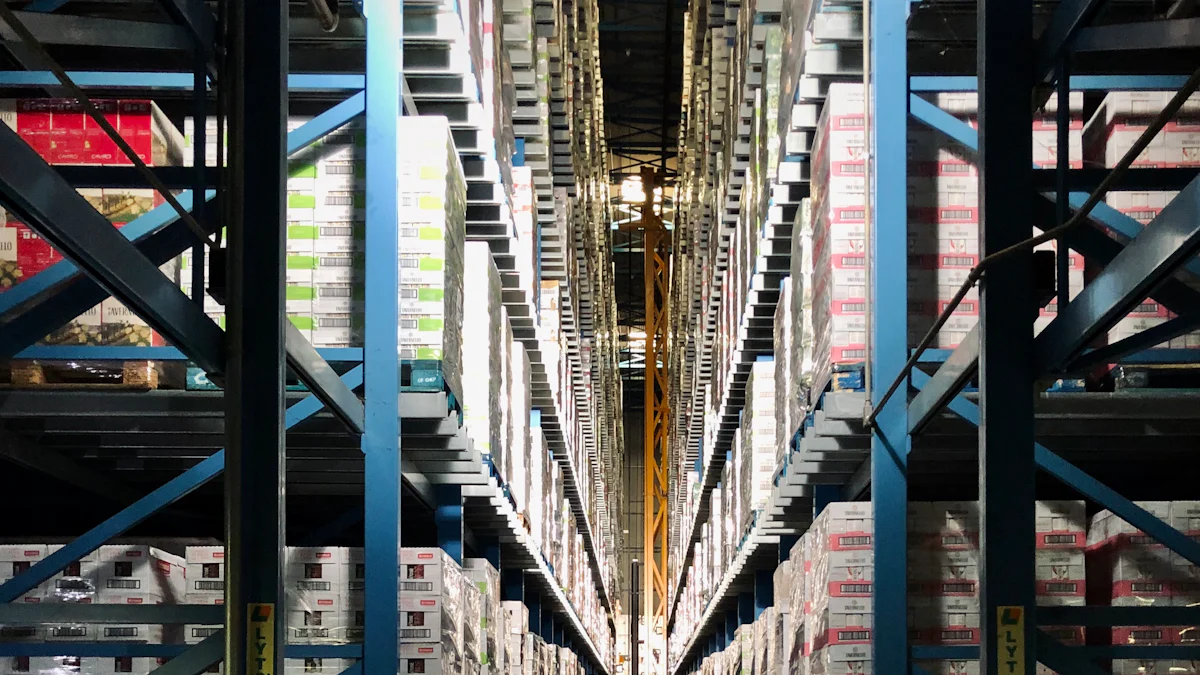2024 Insights: The Future Impact of AI on Smart Supply Chains

Artificial Intelligence (AI) has revolutionized modern supply chains. Organizations experience significant cost reductions and revenue increases through AI adoption. Rapid advancements in AI technology enhance operational efficiencies, inventory management, and demand forecasting. Understanding 2024 insights becomes crucial for businesses aiming to stay competitive. AI-driven supply chains unlock new opportunities for innovation and growth. The transformative potential of AI in supply chain management cannot be overstated.
2024 Insights: Technological Advancements in AI

2024 Insights: Machine Learning and Predictive Analytics
Enhancing Demand Forecasting
Machine learning algorithms revolutionize demand forecasting. AI-powered models analyze historical data and predict future demand with unprecedented accuracy. Companies can optimize inventory levels, reduce carrying costs, and improve overall supply chain efficiency. This technology minimizes stockouts and overstock situations, ensuring that products are available when needed.
Optimizing Inventory Management
AI tools determine optimal inventory levels by analyzing historical demand and supply data. These tools help avoid over-production and storage costs. Automated reordering and real-time tracking ensure ideal stock levels. AI evaluates massive datasets to precisely predict demand, lowering overstock and stockouts. This leads to better inventory control and improved supply chain performance.
Internet of Things (IoT) Integration
Real-time Tracking and Monitoring
IoT devices provide real-time tracking and monitoring of goods throughout the supply chain. Sensors and connected devices collect data on location, temperature, and condition. This information allows companies to monitor shipments in real time, ensuring that products arrive in optimal condition. IoT integration enhances visibility and transparency, leading to more efficient and reliable supply chains.
Improved Asset Management
IoT technology improves asset management by providing detailed insights into the status and performance of equipment. Companies can track the usage and maintenance needs of machinery and vehicles. This data helps in scheduling timely maintenance, reducing downtime, and extending the lifespan of assets. IoT-enabled asset management leads to cost savings and increased operational efficiency.
Robotics and Automation
Streamlining Warehouse Operations
Robotics and automation streamline warehouse operations by performing repetitive tasks with high precision. Automated systems handle picking, packing, and sorting of products, reducing human error and increasing efficiency. Robots work around the clock, ensuring that warehouses operate at maximum capacity. This technology leads to faster order processing and reduced labor costs.
Enhancing Last-Mile Delivery
AI and robotics enhance last-mile delivery by optimizing routes and improving delivery times. Autonomous vehicles and drones deliver packages directly to customers, reducing the need for human drivers. AI algorithms analyze traffic patterns and weather conditions to determine the most efficient delivery routes. This results in faster, more reliable deliveries and improved customer satisfaction.
Operational Efficiencies

Cost Reduction
Minimizing Operational Costs
AI-driven solutions significantly reduce operational costs in supply chains. Automated systems handle repetitive tasks, eliminating the need for extensive manual labor. This leads to lower labor costs and increased productivity. AI algorithms optimize resource allocation, ensuring efficient use of materials and energy. Companies experience substantial cost savings by minimizing waste and improving process efficiency.
Reducing Waste and Overproduction
AI technologies help reduce waste and overproduction by providing accurate demand forecasts. Machine learning models analyze historical data to predict future demand patterns. Companies can adjust production schedules accordingly, avoiding excess inventory and associated storage costs. AI-driven insights enable precise production planning, leading to more sustainable and cost-effective operations.
Speed and Accuracy
Accelerating Order Fulfillment
AI enhances order fulfillment speed by automating various supply chain processes. Robotics and automated systems handle picking, packing, and shipping tasks with high precision. This reduces order processing times and ensures timely deliveries. AI-powered route optimization tools determine the fastest delivery routes, further accelerating order fulfillment. Customers benefit from quicker and more reliable service.
Enhancing Accuracy in Supply Chain Processes
AI improves accuracy in supply chain processes through advanced data analytics. Predictive models identify potential errors and inefficiencies, allowing companies to address issues proactively. Real-time monitoring systems track inventory levels and shipment statuses, ensuring accurate and up-to-date information. Enhanced accuracy leads to fewer mistakes, reduced returns, and higher customer satisfaction.
Enhanced Decision Making
Data-Driven Strategies
AI empowers companies to develop data-driven strategies for supply chain management. Advanced analytics tools analyze vast amounts of data to uncover trends and patterns. Decision-makers gain valuable insights into market dynamics, customer preferences, and operational performance. Data-driven strategies enable companies to make informed decisions, optimize processes, and stay competitive in the market.
Real-time Decision Support Systems
AI provides real-time decision support systems that enhance supply chain management. These systems analyze current data and provide actionable recommendations. Companies can respond quickly to changing market conditions and operational challenges. Real-time decision support improves agility and resilience, ensuring that supply chains remain efficient and effective.
Potential Challenges and Solutions
Data Security and Privacy
Protecting Sensitive Information
Organizations must prioritize data security to protect sensitive information. AI systems process vast amounts of data, making them attractive targets for cyberattacks. Implementing robust encryption methods and secure access controls can safeguard data. Regular security audits and updates ensure that systems remain resilient against threats. Companies must invest in advanced cybersecurity measures to maintain trust and integrity.
Ensuring Compliance with Regulations
Compliance with data privacy regulations is crucial for AI-driven supply chains. Laws like GDPR and CCPA impose strict requirements on data handling and storage. Businesses must stay updated on regulatory changes and adapt their practices accordingly. Establishing clear data governance policies helps ensure compliance. Training employees on data privacy best practices further strengthens adherence to regulations.
Integration with Existing Systems
Overcoming Legacy System Barriers
Legacy systems often pose significant challenges for AI integration. These outdated systems may lack the compatibility needed for seamless AI adoption. Upgrading or replacing legacy infrastructure can be costly but necessary. Companies should conduct thorough assessments to identify integration gaps. Partnering with technology experts can facilitate smoother transitions and minimize disruptions.
Ensuring Seamless Integration
Achieving seamless integration requires careful planning and execution. Businesses must develop comprehensive integration strategies that align with their goals. Utilizing middleware solutions can bridge the gap between old and new systems. Continuous monitoring and testing ensure that integrations function correctly. Effective communication among stakeholders promotes a unified approach to integration efforts.
Workforce Adaptation
Training and Skill Development
AI adoption demands a skilled workforce capable of leveraging new technologies. Organizations must invest in training programs to upskill employees. Providing hands-on experience with AI tools enhances proficiency. Encouraging continuous learning fosters a culture of innovation. Allocating resources for training ensures that the workforce remains competitive and adaptable.
Managing Workforce Transition
Transitioning to AI-driven operations requires effective change management. Clear communication about the benefits of AI adoption helps alleviate employee concerns. Creating a supportive environment encourages experimentation and risk-taking. Offering support and resources during the transition period aids in smooth adaptation. By addressing workforce challenges proactively, companies can unlock new growth opportunities.
The blog highlights the transformative potential of AI in supply chains. AI-driven systems enhance demand forecasting, inventory management, and operational efficiencies. Businesses should prepare for the future by adopting AI technologies. Companies must invest in predictive analytics to stay competitive. Organizations that adapt to AI trends will gain a competitive edge. Continuous learning and adaptation are crucial for success. Embracing AI can lead to significant improvements in costs, inventory levels, and service quality. Businesses should prioritize training and skill development to leverage new technologies effectively.
See Also
Revealing Tomorrow's Supply Chain: AI Integration Discoveries
Maximizing Productivity: AI Logistics Advancements
Artificial Intelligence in Logistics: Transforming Future Operations
Improving Supply Networks: Big Data's Influence Exposed
Data-driven Transformations: Machine Learning in Supply Chain Optimization
